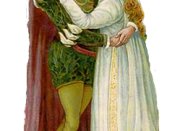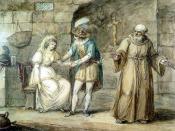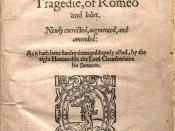Romeo and Juliet is one of William Shakespeare's more renowned plays. Verona, Italy sets the stage for an ancient family feud between the Capulets and the Montagues. When Romeo and Juliet meet and fall in love at a party held by Lord Capulet, a chain of events lead to their eventual suicides, after which the family feud is ended. The essence of the story comes down to a question of fate versus free choice. Did the ploys of fate - the family feud between the Capulets and the Montagues, the love between Romeo and Juliet, the ill timed quarantine of those with the Plague and the time and place of the story overcome free choice?
The family feud between the Capulets and Montague and the troubles that arise for Romeo and Juliet's story set the scene for the narrative. Without the problems of name and lineage, Romeo and Juliet could freely have fallen in love and been married, as is stated by Juliet 'Deny thy father and refuse thy name.
Or if thou wilt not, be but sworn my love, and I'll no longer be a Capulet.' (Act 2, Scene 2) Juliet is happy to give up who she is as long as she can marry Romeo. However, yet again the schemes of fate prevent this from happening as free choice has been taken away from the young lovers, with them not being able to proclaim their love for each other.
Did Friar John choose to be quarantined? As Friar Laurence says 'Unhappy fortune.'(Act 5, Scene 2.) The bad fortune that Friar John was quarantined for helping those sick with the Plague is yet another example of free choice not existing. If Friar John had not been quarantined and Romeo had received the letter, both Romeo and...


